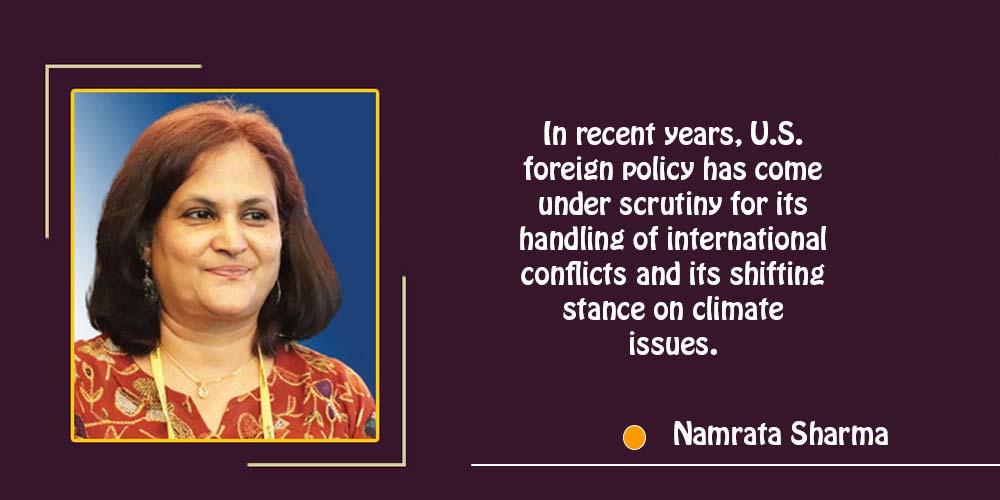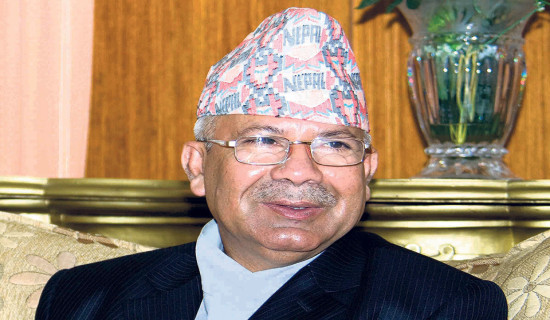- Sunday, 22 February 2026
Global Implications Of US Elections
2024 has been a year of critical elections worldwide, but the U.S. election on November 5, 2024, has captured the attention of both the wealthiest and poorest nations. As a long-standing symbol of democracy, the United States is often seen as a global leader in democratic values, particularly when those values are threatened. However, many question whether the U.S. has consistently protected democracy—or, in some cases, worsened its state. Its involvement in Afghanistan, Iraq, and Iran, for example, has been widely criticised, especially after the Taliban regained control in Afghanistan shortly after the U.S. and its allies withdrew.
Currently, ongoing conflicts in Gaza and Ukraine reflect a complex global landscape, one where resolutions are far from realisation. These issues, along with domestic challenges such as immigration, workers’ rights, women’s reproductive rights, healthcare, and employment, have strongly influenced this election campaign.
Democratic ideals
Regardless of who wins, history will be made. If Kamala Harris secures the presidency, she will be the first woman to hold the position. Already the first woman of colour and the first person of African and Asian heritage to serve as U.S. Vice President, Harris’s victory would send a message to the world that the U.S. upholds democratic ideals. It would show that, in the U.S., any citizen who works hard and embodies American values of family, community, and democracy can aspire to the highest office, regardless of gender, colour, class or background.
If Donald Trump wins, he would be only the second president in history to win a second term after losing a previous re-election bid — and he would do so despite being the first former president convicted of a crime. This would undoubtedly raise questions about the democratic values the U.S. claims to champion. Trump’s candidacy, despite criminal convictions, has raised questions about the interpretation of democracy in one of the world’s oldest democracies. The U.S. is a beacon for immigrants worldwide, representing a place where dreams can be realised, though many aspiring immigrants may not fully understand the challenges involved.
Trump's policies and rhetoric toward immigrants and migrant workers have raised eyebrows, marking a significant departure from traditional presidential aspirations. However, Trump still garners support from a segment of the population who favour his policies, including anti-abortion stances and pro-gun rights. Many speculate that some Americans prefer a white male president, particularly during times of war, and support Trump’s vocal stance on reducing illegal immigration. At the same time, many Americans, including Republicans, oppose his candidacy, criticising what they view as his racist and sexist remarks.
Harris, the Democratic candidate, embodies the idea that the U.S. provides a fair opportunity for all deserving citizens to realise the American Dream. As a woman of colour, Harris has faced scepticism about her ability to lead in times of war and manage global issues. Yet her supporters highlight her strong record as a leader both personally and professionally. After Harris’s candidacy was announced, some speculated that the Democratic Party might have made a risky choice. However, as the campaign has progressed and debates have unfolded, Harris has steadily gained support. At the time of writing this article, she leads slightly in opinion polls.
Whether we like it or not, U.S. elections are a global concern. In countries like Nepal, where USAID plays a crucial role in developing infrastructure and supporting marginalised communities, the outcome of this election is closely watched. U.S. support for reproductive health, for instance, has had a profound impact on developing nations, while in the U.S., women’s reproductive rights and abortion access have been key campaign issues. Republicans generally hold conservative views on these matters, while Democrats advocate for women’s autonomy.
In recent years, U.S. foreign policy has come under scrutiny for its handling of international conflicts and its shifting stance on climate issues. Many global citizens hope that this election will mark a turning point, leading to a more measured and consistent approach. For countries affected by U.S. policy, such as Ukraine and regions in the Middle East, the outcome of this election could signal either renewed diplomatic efforts or continued tensions. The question is whether the next U.S. president will address these challenges with a more cooperative approach, aligning with allies and global organisations to seek peace and stability.
US climate policy
As the world is heading towards climate change and environmental degradation, the policies of the two candidates are scrutinised a lot. Harris has proposed several policies for reduction of carbon emission. However, Trump is known to be a champion of industrial growth and does not have policies that could impact climate change in a proactive manner. Beyond foreign policy, the U.S. election has implications for climate change and environmental sustainability. The world is witnessing increasingly severe climate-related disasters, from wildfires to hurricanes, and there is an urgent call for the world’s largest economies to act. For the U.S., the stakes are high, as its policies influence global emissions, sustainable energy investment, and environmental preservation.
By the time this article is published, the U.S. will have voted for the new president. Let us hope that whoever assumes office will lead the country — and the world — toward a more peaceful and environmentally sustainable future.
(Sharma is a senior journalist and women’s rights advocate. namrata1964@yahoo.com, Twitter handle: @NamrataSharmaP)










-original-thumb.jpg)

-copy-original-thumb.jpg)
-original-thumb.jpg)


